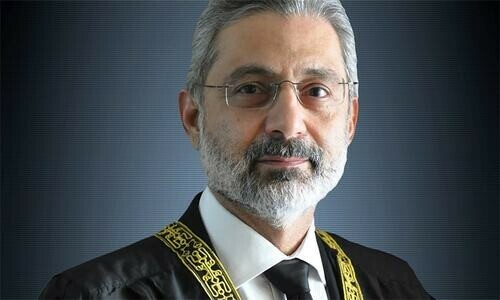
[ad_1]

• Supporters hail his landmark rulings, efforts to make SC proceedings public
• Detractors point out ‘divergence’ from stated positions, ‘inaction’ on key issues
ISLAMABAD: The outgoing chief justice of Pakistan (CJP), Qazi Faez Isa, took the Supreme Court’s reins on September 17, 2023, with striking optics — his wife standing by his side as the president administered the oath to him.
It was unprecedented. After his predecessor’s tenure — marred by fissures and disharmony among brother judges — the image from that oath-taking ceremony led many to believe that he’d bring the court together.
His action of appointing Jazeela Aslam as the first woman registrar of the top court only strengthened the optimism. However, over 13 months later, his detractors say, those hopes did not materialise.
On one end of the spectrum of his divisive legacy are those who hail him for bringing trans-parency to the Supreme Court’s affairs by broadcasting its proceedings on important constitutional matters live.
But on the other end are those who point out many faults in CJP Isa’s time at the helm — his inability to sort out differences among judges and his perceived divergence from his stated positions.
The expectation of unifying the court to restore its credibility was not fulfilled, for he is leaving the court, more or less, in a similar state.
On multiple occasions, his fellows — ex-justice Ijazul Ahsan and incumbent justices Syed Mansoor Ali Shah and Munib Akhtar — expressed their differences over judicial and administrative affairs in letters to the CJP.
‘Independent-minded’
To his credit, the CJP diluted his powers by upholding the Supreme Court (Practice and Procedure) Act 2023, which said benches to hear cases of public importance would be formed by a three-judge committee.
The move broke CJP’s stranglehold on bench formations.
He has also been a strong proponent of parliamentary supremacy. Throughout his career, he never shied from sharing his thoughts during court proceedings and in public.
According to Salahuddin Ahmed, former president of Sindh High Court Bar Association, CJP Isa had a reputation for being an independent-minded judge “capable of standing up to the military” and to his predecessors as well.
But as CJP, Mr Ahmed said, his legacy can be divided into two parts.
He “started brilliantly” by forming a full court bench to hear the challenges to the Supreme Court (Practice and Procedure) Act, 2023.
The bench, with a majority of 10-5, sustained the law as “constitutional”.
He followed it with other notable verdicts as part of larger SC benches: upholding the conviction of former dictator Gen Pervez Musharraf, ‘mea culpa’ over the trial of former prime minister Zulfikar Ali Bhutto, overturning of lifetime disqualification for politicians in Article 62 (1) (f) case and declaring unlawful the removal of former judge Shaukat Aziz Siddiqui.
Unfortunately, Mr Ahmed said, the CJP’s legacy was “tarnished” as he failed to “rise above his alleged resentment against the PTI founder” and decided to “deprive” PTI of its electoral symbol.
In its ruling on Jan 13, the three-member bench didn’t clarify that the decision would not affect PTI’s status as a political party or its ability to field candidates and nominate persons to reserved seats, Mr Ahmed said.
While the ECP misinterpreted the verdict and denied PTI “its rightful seats”, CJP Isa never joined other judges “in righting an error created by a lack of clarity in his own judgement”.
The ‘divergence’
For detractors, the CJP’s perceived diversion from his stated positions as a judge on a number of issues has undermined his legacy.
One of those positions was on presidential ordinances, which he said should only be promulgated in an emergency. However, as a CJP, he voiced no opposition to them.
He even moved with alacrity when a presidential ordinance granted him the power to appoint the third judge to the three-member committee that forms benches, Mr Ahmed pointed out.
A staunch opponent of military courts, the CJP showed an inexplicable lack of interest in fixing the appeal against the verdict which voided military trials of civilians, Advocate Ahmed added.
The CJP also failed to acknowledge the intimidation and surveillance by intelligence agencies after Islamabad High Court judges wrote letters to the Supreme Judicial Council.
Finally, the effects of the 26th Constitutional Amendment — passed during the fag end of his tenure — on judicial independence and efficiency will be a burden on CJP Isa’s legacy, Advocate Ahmed observed.
Former additional attorney general (AAG) Tariq Mehmood Khokhar called the amendment a “supreme irony”.
He said the senior puisne judge was “purged” after the amendment and persons “lacking democratic legitimacy” empowered themselves to form constitutional benches.
“The casualties are the judiciary’s independence and the integrity of the Supreme Court.”
Published in Dawn, October 25th, 2024
[ad_2]
Source link






